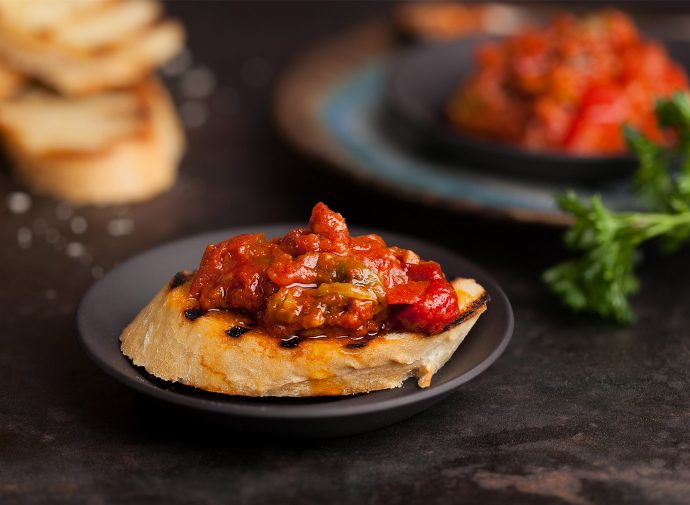Chachouka is a Moroccan dish that is usually served with eggs. Different Middle Eastern countries have their own versions. It can also be served as a tapa, or a condiment to accompany meat and fish.
The recipe that I am sharing is from my previous boss whose Turkish family has handed it down for generations.
The secret is to cook the chachouka in a heavy-bottomed pan, as it needs to simmer slowly for a lengthy time. Another dish that gets better with age;)
Ingredients
3 Green Bell Peppers
2 Red Bell Peppers
4 Cups Diced Ripe Tomatoes with their juices (I use a good quality canned diced tomatoes as they
have a richer flavor)
1 generous pinch of Coconut Sugar
2-3 finely minced Garlic Cloves
1⁄2 tsp Red Pepper
I prefer the Espelette pepper from Basque country, but you can also use cayenne. I’ve also successfully used the Ethiopian spice blend Berbere.
1⁄4 C Extra Virgin Olive Oil
1 Tbl Sweet Paprika
Instructions
The first thing you need to do is roast all of the peppers over an open flame or on a grill. Char them completely and place in a paper bag or plastic covered bowl to sweat. When cool enough to handle, peel all the charred skin and remove the seeds. Cut into julienne strips about 1⁄2” wide.
Pour tomatoes in heavy saucepan with the garlic, peppers, pinch of vegan sugar and red pepper. Put heat on medium-high until the mixture starts to bubble, then turn down to low. Keep a wooden spoon handy as it needs to be stirred occasionally to make sure it’s not scorching on the bottom of the pan.
This usually takes about 1 ½–2 hours. All of the liquid should reduce and the mixture will have a jam-like consistency. Remove from heat, stir olive oil and paprika together, and add to the chachouka. I usually don’t use additional salt. Let cool. Serve at room temperature as a condiment with wonderful bread or heat it in a baking dish and break a few eggs on top. Continue baking until the eggs are just set or cook eggs under the broiler. You want the whites set and yolks runny. Garnish with fresh cilantro.

